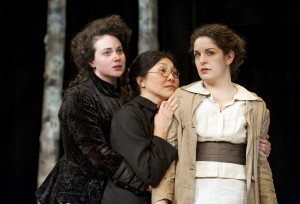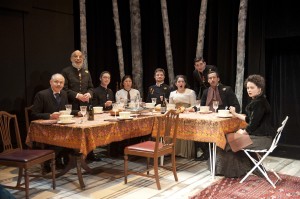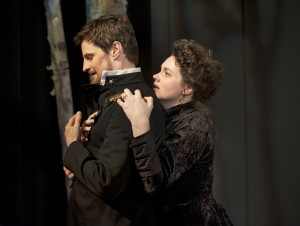
and Rachel Aberle
Credit: Emily Cooper
At The Cultch (VanCity Culture Lab) until April 20
604-251-1363/tickets.thecultch.com
Posted on April 5, 2013
If Chekhovian means bo-ring to you, here’s an opportunity to turn your head around. Directed by Jane Heyman for the newly formed The Only Child Collective, this production is romantic, funny and heart wrenching in Amiel Gladstone’s fresh and lively adaptation.
Three Sisters, written in 1901 by Anton Chekhov, is about a family and like all families, the Prozorovs have their problems. The mother and father have died leaving Olga (28), Masha (24), Irina (20) and their weak-willed brother Andrei to fend for themselves in an isolated backwater far away from bustling Moscow where they grew up.
Andrei (Alex Rose) is courting Natasha (Adele Noronha), a social-climbing, lower-middle class woman who, after Andrei marries her, turns into a vulgar nag. Olga, a prim schoolteacher, has no marriage or career prospects; bubbly Irina is being courted by several military officers she has no interest in and thinks if she could only get back to Moscow she would find love; and yawning, beautiful Masha, married to dull, pedantic Kulygin falls in love with Vershinin who repeatedly and solemnly reminds everyone, “I have a wife and two little girls.”
And, because it’s Chekhov, there’s Chebutykin, a doctor given to drink, who hangs around the Prozorov household like a tattered old dressing gown.

Credit: Emily Cooper
Pam Johnson’s set, dapplingly lit by Itai Erdal, captures elegance slightly on the decline. Slim trunks of white birch trees ring the backstage. A dining room table and chairs stage right suggest a dinner party about to happen and centre stage features a red Persian-style carpet and a chaise longue – perfect for Irina on which to recline or throw herself dramatically. Mara Gottler’s period gowns set the scene in turn of the century Russia: conservative black and brown wool for Olga, stylish black silk and velvet for Masha and virginal white for Irina.
Director Heyman has picked her way through Vancouver’s finest from William Samples and Rosy Frier-Dryden as the old porter and the old nurse to David Bloom (Kulygin), Richard Newman (Chebutykin) and Bob Frazer (Vershinin).
Rachel Aberle’s Irina is giddy and full of girlish optimism. Aberle gets a laugh when Irina, having been praised for speaking Italian, chirps, “Ciao” as if to prove by that one, commonplace word, her mastery of the language. Manami Hara’s Olga is pragmatic and stoic, the older sister who looks out for the others.
As Masha, beautiful Emma Slipp, tendrils of dark curls escaping from her upswept hair, is, in this production, more pivotal than in my reading of the play or other productions I’ve seen – possibly because Slipp is so charismatic. Usually, Three Sisters is Irina’s play and Chekhov’s commentary on the inevitable failure of life to live up to expectations – at least in that era when three grown sisters would be at the mercy of the one ineffectual male heir to the family fortune. This production shifts the focus more on Masha’s doomed relationship with Vershinin than on Irina’s fate.

Credit: Emily Cooper
This brings me to Bob Frazer who has grown over the years from a boyish, gee-whiz performer into a mature, thoughtful, calm, still actor. The plight of Slipp and Frazer, a dynamic duo, is the strongest element in this production. Chekhov purists may balk at this as well as this production’s less subtle style. These sisters cry and laugh – perhaps too much – but they come off as real.
Brahm Taylor, Luc Roderique and Tim Carlson, Studio 58 grads all, very capably complete the cast.
This is an intimate production that quickly draws you into the lives of the Prozorovs. Although it speaks of boredom, restlessness and disappointment, it is none of these. It’s Chekhov for those who love Chekhov and are prepared to give this production some latitude as well as for those who don’t think they like Chekhov at all. They exist?

